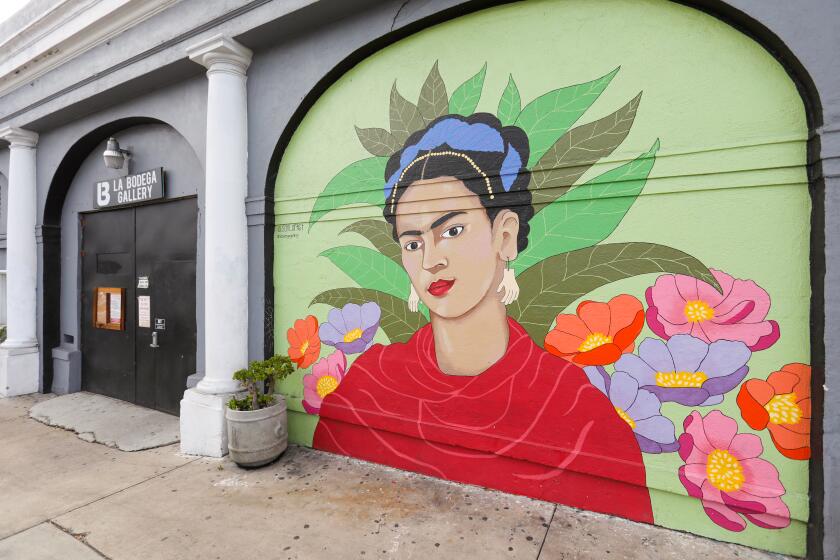Op-Ed: How previous financial trauma keeps Latinos in the U.S. from investing

- Share via
Many Latinos living in the U.S. suffered through acute economic upheaval in their countries of origin. Our troubled experiences influence our financial behavior and our economic outlook. It’s like we have financial PTSD.
Our instinctive reaction is to save money in places that feel safe — under the mattress or, at best, in a checking or savings account — rather than investing it to build wealth. Far too many Latinos grew up with parents who did this because they had no trust in banks.
We know firsthand how life-altering experiences can lead to financial trauma. During our childhoods, one of us lived in Mexico and the other in the Dominican Republic. When the economies in our home countries toppled without warning, we witnessed our families lose their savings within hours.
Beatriz remembers the uncertainty in her parents’ faces as her family watched the Mexican president on TV in 1976 announce the peso was being devalued by about 60% effective immediately; in the following years inflation was as high as 125%. Beatriz, then 8, had a fruit pie business that tanked overnight. She’d sell them after school at her father’s office building. Suddenly, she couldn’t afford ingredients, and her customers couldn’t afford to buy a treat from a little girl.
Jacqueline was also 8 years old when her family returned to the Dominican Republic in search of safer streets and schools than what they had experienced in Washington Heights in Manhattan in the mid-1980s. But not too long after they arrived, the country was torn apart by political unrest. By 1989, her parents had lost their life savings as banks disappeared seemingly overnight and the peso was devalued by more than 300%. They came back to New York and stayed with family for two years until they regained their financial footing.
Denigrating multilingualism is rooted in the desire to restrict who can belong here. Saying our true names is one way to fight that idea.
Stories like ours are not the exception. The trauma of acute economic crises compounded by chronic financial uncertainty has influenced our ability to trust financial institutions.
This is exacerbated by racist banking policies in the U.S. that prevent Latinos from acquiring loans for their homes and businesses. In 2019, Latino applicants were denied a loan at a rate that was 43% higher than the rate for non-Latino white applicants. In addition, 60% of Latinos have no or limited access to banks in the U.S., according to Federal Deposit Insurance Corp. data.
Consequently, we hang on to our money, just in case. We call it colchón de emergencia. Money under the mattress for emergencies. Latinos have too often seen that the next emergency is right around the corner, and no one’s coming to help.
Instead of trusting financial institutions, Latinos trust their own community. Many join tandas, informal peer lending and saving clubs that redistribute money around the community and pay interest collectively to the member who organizes it.
We Latinos can take steps to rebuild our confidence in financial institutions and invest it in places that may seem unfamiliar — but that will grow our money. To do so, we should take advantage of new technology that has democratized investing and will help us build generational wealth.
Start small but start investing. Begin with $5. The next time invest $10, and so on. By taking incremental steps, you can keep building confidence and eventually start taking larger risks.
Take advantage of democratized investments. To invest, you used to need serious cash. Not anymore. Apps are now available that can help users purchase fractional shares of stock or no-minimum investments in reputable assets. Few apps focus on Latino investors; two that do are Finhabits and Suma Wealth, which was developed by a tech startup Beatriz founded in 2020. Online tools designed for people with little financial experience are also available to help grow wealth.
Barrio Logan in San Diego has a chance to show that ‘gentefication’ doesn’t have to come at the expense of marginalized residents.
Build peer-learning communities. Latinos are more likely to trust products and services made for us and by us. One example: the growing network of Latino Giving Circles — emerging Latino philanthropists pool their resources to invest in grass-roots organizations that serve their communities. This type of philanthropy is taking off in the Latino community because it builds on the power of collective giving and a “paying it forward” ethos that is widely shared by Latinos.
If Latinos in the United States inhabited their own country, it would have the seventh-largest gross domestic product in the world. Latino buying power has grown significantly over the last 30 years, reaching more than $1.9 trillion in the U.S. in 2020.
We have the financial power. We just need to wield it.
With rising inflation, it may seem counterintuitive to focus on learning to invest at this moment because our dollars aren’t stretching as far. But the sooner we start, the more money we will make over the long run. After all, a dollar will shrink only if it’s kept under a mattress.
Beatriz Acevedo is the chief executive and co-founder of Suma Wealth. Jacqueline Martinez Garcel is the CEO of the Latino Community Foundation.
More to Read
A cure for the common opinion
Get thought-provoking perspectives with our weekly newsletter.
You may occasionally receive promotional content from the Los Angeles Times.












